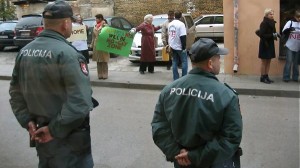
Vilnius Police Chief Kęstutis Lančinskas said his department would do all it could to prevent violence from anti-gay protesters.
VILNIUS — The Supreme Administrative Court of Lithuania restored the validity of the Baltic Pride gay parade, meaning that the march will go ahead as planned Saturday at noon despite fears of violence.
The permit to hold the march was suspended on Wednesday after General Prosecutor Raimondas Petrauskas and Kaunas city council member Stanislovas Buškevičius petitioned for its rescinding, testifying that Vilnius police are not capable of controlling the situation if it got out of hand with anti-gay protesters. The Vilnius Regional Administrative Court then ruled to suspend the permit.
The court decided to reinstate the permit and allow participants the constitutional right to meet in peaceful meetings after the general prosecutor’s office could not present any solid evidence that the police could not guarantee the safety of participants.
Vilnius Police Chief Kęstutis Lančinskas Friday morning said that 800 officers and dog squads would be in place for the parade. Police have said that there will is no guarantee that the two sides would not clash.
“One hundred percent we can not guarantee that there will not be any problems, but will make all efforts to ensure order. So, from today, 7 p.m. today will not allow people to leave their cars near the river. We need to remove them from the place where they will interfere with police work. In addition, vehicles may be left with explosives,” Lančinskas said.
The streets where the parade will be held have been fenced off already and cars will be removed if left past 7.p.m. Friday evening.
All calm on the Swedish front
From only across the Baltic but a different world in terms of acceptance of homosexuals, Sweden’s Minister for European Affairs Birgitta Ohlsson is in Vilnius for the parade and at a press conference she said that she is delighted at the decision.
“I feel very proud — not only for Lithuania — this is a great step to have the parade tomorrow. It was a great decision for human rights and the basic values of the EU. Freedom of assembly, expression and speech are the core values of Europe. These political issues are the ground work for human right issues, so a good decision from the court,” Ohlsson said on Friday afternoon just minutes after the court approved the parade.
The minister said that this is a big step forward for gay rights in Lithuania.
“When it comes to minority rights, it is a litmus test for Europe today. LGBT rights can be controversial in some countries. It is good to see how minorities are treated. This issue has not only to do with gay rights, but basic human rights and that’s why EU countries have reacted so strongly,” she said of the backlash that Lithuania saw from Europe.
Responding to the question that Sweden was seen to be meddling in Lithuanian affairs, Ohlsson stated plainly that EU matters are the jurisdiction of all members.
“This is not controversial at all. All members of the EU have signed an agreement to respect these values so we have to work together with this. It is not just the Swedish government, but also other EU countries and non-EU countries too,” she said.
Ohlsson will march in the parade and be accompanied by her personal security entourage.
Lithuania’s first time
Saturday’s procession to the Sport Palace will be the first gay parade in Lithuania’s history, and has proved extremely controversial in the conservative Catholic country.
A survey commissioned by the Baltic News Service showed Thursday that 73.3 percent of Lithuanians do not want the parade to take place.
The parade has seen stiff opposition in Lithuania’s parliament. Seimas member Petras Gražulis, who has been a mouthpiece for the homophobic movement, was campaigning to have the parade canceled as well as homosexuality criminalized again.
Lithuanians are the least aware of homosexual people in their families or circle of acquaintances in the European Union. According to a Eurobarometer survey released in November, some 93 percent of Lithuanians are unaware of the existence of gay people living in their community. The EU average is 38 percent being aware of gay people in the community.
This article is free to view. To read Baltic Reports’ subscription-only articles, click here.












